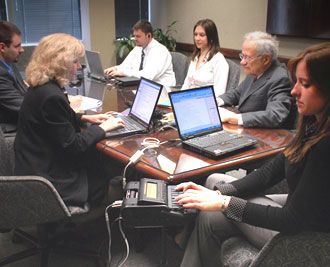 by Chris LaFrance of Cordell & Cordell, PC
by Chris LaFrance of Cordell & Cordell, PC
There are two primary purposes for the opposing attorney to take your deposition. The first is to obtain information that may lead to relevant disclosure, such as your finances, and the second, is to pin down your testimony on the issues in your case as much as possible so that any deviation from your deposition testimony at the time of trial will subject you to an impeachment of your credibility.
During a deposition, the opposing attorney may use a variety of tactics to gather information and to assess what your demeanor will be at the time of trial. The attorney may be nice, attempting to put you at ease and lull you into a false sense of security. The hope is with your guard down, you will say more than you should or will not be careful in how you respond to the attorney’s question, giving them an inaccurate response that may be harmful to your position, but favorable to their client’s case. Remember, no matter how nice opposing counsel may be during your deposition, he is not your friend. His job is to represent his client, not you. Sometimes an attorney will attempt to “push your buttons” to see if he can cause you to lose your temper. Again, if you are angry, you are less likely to listen carefully to the questions and respond appropriately. No matter which strategy is employed by the opposing counsel, if you remember a few simple rules your deposition will not be nearly as traumatic as you may anticipate it to be.
The first rule is to be honest. If you answer the question honestly, even if you give information you might rather keep to yourself, both your deposition and your case will go much more smoothly.
Listen to the question and only answer the question that has been asked. The best way to do this is to pause after each question to think about what has been asked and what information is required to respond to the question. Once you have provided the information that responds to the question, Stop Talking. Do not volunteer any information. If the attorney asks you a question about checking accounts, respond with the appropriate information about checking accounts. Do not volunteer information about savings accounts.
Do not think out loud. Witnesses sometimes have a habit of thinking out loud while they attempt to remember the information that responds to opposing counsel’s question. The entire time you are speaking, opposing counsel is listening to everything you say which can lead to questions that otherwise would not have been asked.
Do not get in the habit of telling a story or responding to a question with a long narrative. Your time to tell your side of the story comes when your own attorney is asking you questions, not when opposing counsel is examining you. Keep your answers confined to only the information necessary to respond to the question that was asked.
Do not overanalyze the question being asked. Do not attempt to determine why the attorney is asking you the question, so that you can give a response that you think will strategically improve your position.
Do not attempt to convince opposing counsel why your position is correct and his client’s position is flawed.
Do not argue with opposing counsel. His job is to assess you as a witness. If he thinks he can get to you during the deposition, he will double his efforts to do so at trial and attempt to portray you in an unfavorable light to the court. Do your best to remain calm. If you need to take a break to compose yourself or for any reason, tell your attorney and he will pause the deposition.
Do not answer opposing counsel’s question if you are confused by it. Ask him to rephrase it. If you are asked a question and want to speak with your attorney, typically you will have to answer the question first and then you and your attorney can step outside to discuss the issue. If you need to amend a prior answer, you can do so when the deposition starts again, or your attorney can ask you a question after opposing counsel has concluded his questioning to allow you an opportunity to explain a prior answer.
Do not volunteer to produce documents that may provide an answer to opposing counsel’s question. If you know the answer, provide it. If you don’t know, tell the attorney you do not know. If you don’t remember, tell him you don’t remember. Let him ask if there are any documents that might contain the information he is looking for.
Do not guess when answering a question. If you know the answer, provide the information required to answer the question, otherwise let the attorney know you do not know or if appropriate, you do not remember.
While you should not guess, there are certain questions you must know the answers to. This is true for instance with respect to questions concerning your children when custody is an issue in your case. You should know the answers if questions are asked for example concerning their friends, doctors, health, interests, etc….
If you follow these few basic tips your deposition should go smoothly.
 Chris LaFrance is a Litigation Manager for the Cordell & Cordell, P.C. office in Tampa, Florida. Mr. LaFrance received his B.A. cum laude at the State University of New York at Buffalo in 1989, going on to receive his Juris Doctorate from Albany Law School in 1992. He was admitted in Florida as well as in all New York State Courts, including the United States District Court, and the Southern and Northern Districts of New York.
Chris LaFrance is a Litigation Manager for the Cordell & Cordell, P.C. office in Tampa, Florida. Mr. LaFrance received his B.A. cum laude at the State University of New York at Buffalo in 1989, going on to receive his Juris Doctorate from Albany Law School in 1992. He was admitted in Florida as well as in all New York State Courts, including the United States District Court, and the Southern and Northern Districts of New York.
Read more about Mr. LaFrance.

